

What does the course look like?
ENGLISH LANGUAGE
Paper 1 Explorations in creative reading and writing (WORTH 50% OF QUALIFICATION)
Q1 – Retrieval of information (4 marks)
Q2 – Analysis of language (8 marks)
Q3 – Analysis of structure (8 marks)
Q4 – Arguing your point of view (20 marks)
Q5 – Write a creative piece of writing (40 marks in total –24 for content and 16 for technical accuracy)
Paper 2 Writers’ viewpoints and perspectives (WORTH 50% OF QUALIFICATION)
Q1 – True or false (4 marks)
Q2 – Writing a summary (8 marks)
Q3 – Analysis of language (12 marks)
Q4 – Comparing viewpoints across two texts (16 marks)
Q5 – Write a discursive piece of writing (40 marks in total – 24 for content and 16 for technical accuracy)
ENGLISH LITERATURE
Paper 1 Shakespeare and the 19th Century Novel (WORTH 40% OF QUALIFICATION)
Q1 – Macbeth (34 marks in total – 30 for content and 4 for technical accuracy)
Q2 – Jekyll and Hyde (30 marks)
Paper 2 Modern Texts and Poetry (WORTH 60% OF QUALIFICATION)
Section A: Modern Text
Q1 - Lord of the Flies (34 marks in total – 30 for content and 4 for technical accuracy)
Section B: Poetry Anthology
Q2 - Poetry anthology comparison (LOVE AND RELATIONSHIPS CLUSTER)
Section C: Unseen Poetry
Q3 – Unseen poetry analysis
Q4 – Unseen poetry comparison

College entry (ENGLISH LANGUAGE) exam data, question by question breakdown and GRADES for each paper and OVERALL.
March mock (ENGLISH LANGUAGE) exam data, question by question breakdown and GRADES for each paper and OVERALL.
Each of the questions in the most recent set of mocks for both qualifications have been RAGed so you can see which are the areas for development your child needs to work on.
Mock exam data for LITERATURE
GENERAL Issues: WHAT WE OFFER/SUGGEST
Lack of Student Independence
• Homework for ALL Y11 students is set on a Monday and collected in the following Monday. This is set in physical form of a booklet and also on TEAMS. There is a HOMEWORK SESSION every Monday after school with an English teacher who will give students input on that week’s homework task before students then complete.
• We have seen INCREDIBLE lifts from students from past years who completed a number of independent pieces of revision ahead of the exams. ANY pieces completed and handed in will received feedback. Great opportunity for students to refine their exam skills.
Low Attendance at Revision
• We would like to see ALL students attend at least one revision session per week for English.
• ALL English teachers stay behind once per week and offer this time to their class.
• We also offer additional revision sessions on a Monday after school.
• We also offer holiday and Saturday revision sessions.
Lack of Knowledge of Literature Texts
• Students should be revising ALL of the literature texts regularly using revision guides, revision cards, online platforms – but at this point, this should only take 15-20 minutes and the rest of that revision hour should be spent applying the knowledge to a literature essay. The more rehearsal students can get in at this stage, the better.
• A schedule of the English revision sessions can be found in your packs. Students can book onto these by expressing their interest to their English teacher.
SKILLS Issues: WHAT WE OFFER/SUGGEST
Lack of Planning
• Planning for responses is key for both LANGUAGE and LITERATURE.
• Students should use the planning time to think carefully about specific ideas, find quotes and analyse them, label techniques the writer has used and think about the wider ideas that the writers were trying to convey.
• When students don’t plan, their responses feel clunky and unclear which will limit their marks.
Lack of Depth
• Students have been taught to EXTEND their ideas using the WHICH, SO, BECAUSE method which is where students write an idea down and then use one of the above ideas to extend their idea even further.
• Planning will support with this too because if they have more ideas on their plan, they are more likely to layer their analysis in their responses.
Not Writing Enough
• The recommended order for students to answer the language paper questions is as follows:
PAPER 1: Q5, Q1, Q2, Q4, Q3
PAPER 2: Q5, Q1, Q3, Q4, Q2
• The BEST thing students can be doing now is PRACTISING. Using the materials on TEAMS, in their books or from their English teachers, students should be timing themselves in their independent study so they can get used to the time restrictions in the exam.
• To the right is guidance on how long students should spend on EACH question across all 4 papers.
Language Paper 1
Q1 – 5-10 minutes including reading the source material
Q2 – 15 minutes
Q3 – 15 minutes
Q4 – 20-25 minutes
Q5 – 40-45 minutes
Language Paper 2
Q1 – 10 minutes including reading the source material
Q2 – 10 minutes
Q3 – 15 minutes
Q4 – 25 minutes
Q5 – 45 minutes
Literature Paper 1
Macbeth – 50 minutes
Jekyll & Hyde – 50 minutes
Literature Paper 2
Lord of the Flies – 45 minutes
Anthology Poetry – 45 minutes
Unseen Poetry Analysis – 35 minutes
Unseen Poetry Comparison – 10 minutes
Easter Revision
• ALL students will receive an EASTER HOLIDAY HOMEWORK BOOKLET which looks like this
Over Easter students should:
• Complete their EASTER HOLIDAY HOMEWORK BOOKLET
• Complete their RED & AMBER Language paper questions (in the packs you will get today)
• Fill any Literature gaps
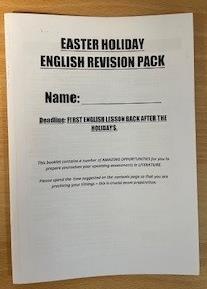
Students will receive guidance from their teachers next week on what EASTER revision should look like.
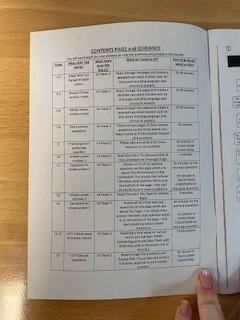
This contents page outlines what each of the tasks is and HOW LONG students are to spend on them.
Revision Materials
• We have placed an abundance of practice questions on MS TEAMS. Students can find them:
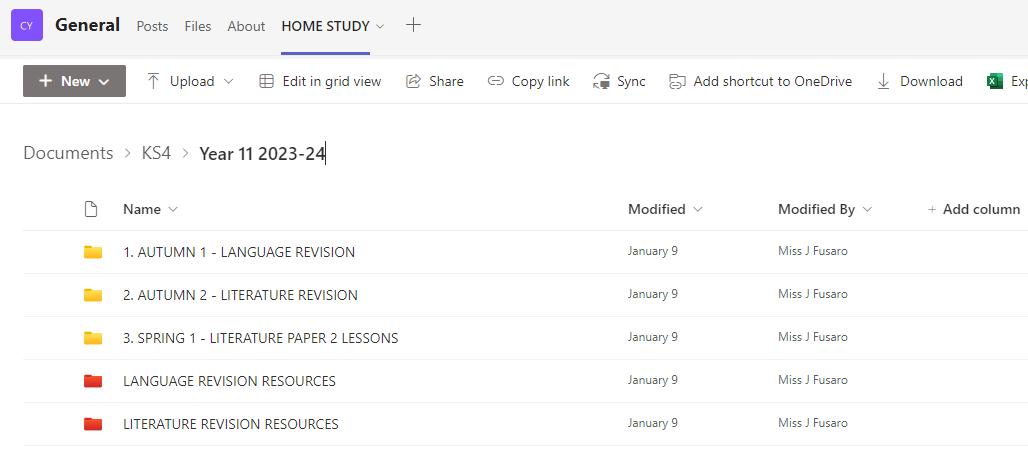
Students can also be working on resources they get in class, and they can ask for new ones printed out from their English teacher.
IN THE HOME STUDY TAB IN THE RED LANGUAGE AND LITERATURE REVISION RESOURCES FOLDERS.
•
Online Platforms
EDUCAKE
• YOUTUBE (MR BRUFF LITERATURE
VIDEOS ARE HELPFUL)
• SPARK NOTES
• BBC BITESIZE
Revision Sessions Available for English
• Every Monday we have HOMEWORK CLUB with an English teacher
• Every Monday we have specific revision sessions running
• Every Thursday after school we have English teachers hosting revision for their classes
• EASTER HOLIDAY/SATURDAY SESSIONS COMING UP THAT STUDENTS CAN ASK THEIR ENGLISH TEACHER TO BOOK THEM A PLACE ON:
• Tuesday 2nd April – FOCUS ON LANGUAGE
• Thursday 4th April – FOCUS ON LORD OF THE FLIES
• Thursday 11th April – FOCUS ON LITERATURE PAPER 2
• Friday 12th April – FOCUS ON LITERATURE PAPER 1 (MACBETH AND JEKYLL & HYDE)
• Friday 12th April – FOCUS ON LITERATURE PAPER 2 (POETRY ANTHOLOGY & UNSEEN)

MFL Key revision resources
In school revision sessions
French Spanish
Foundation Tue 8:00 F9 (Ms Miller)
Higher Tue 2:45 F11 (Mr Felda)
Foundation Thu 08:00 F6 (Ms Mendez)
Higher Tue 2:45 F10 (Ms Baron)
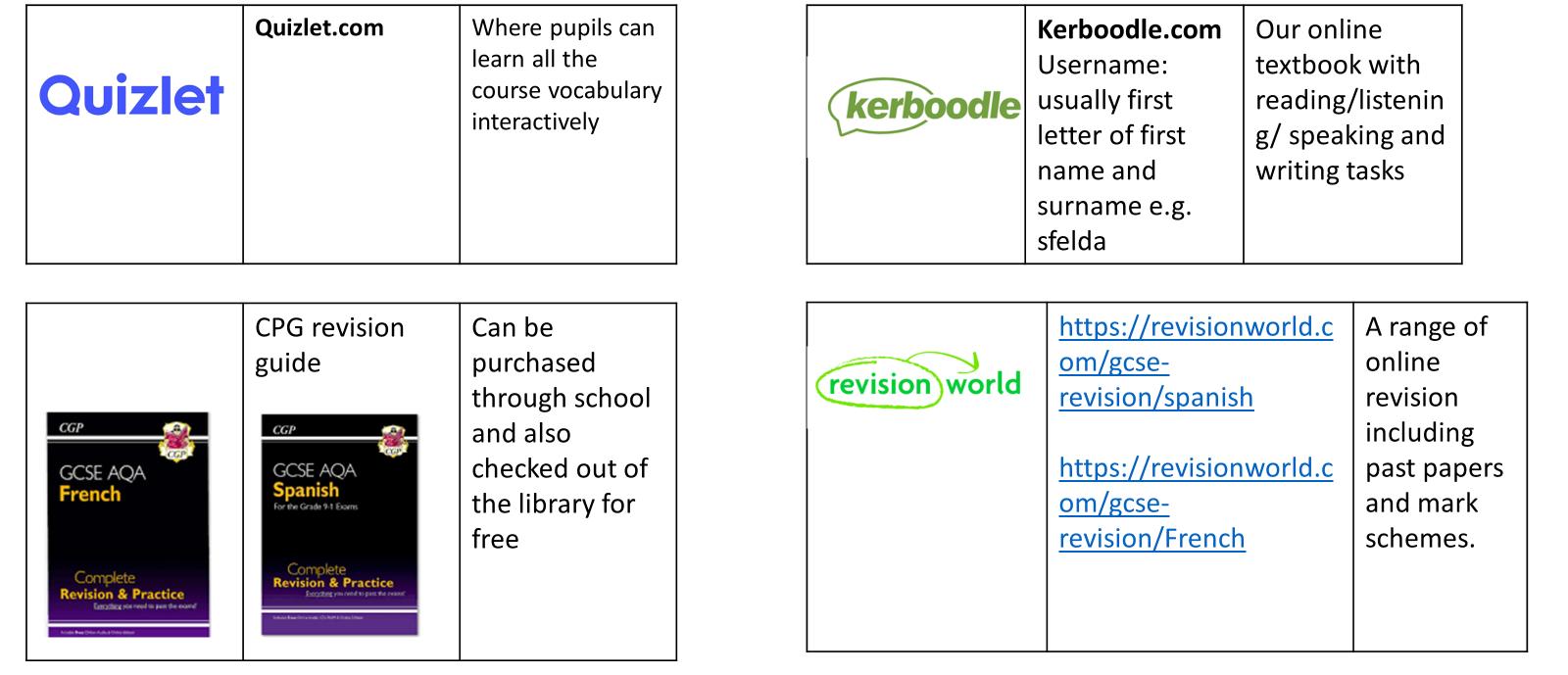


MFL Revision Planning

Recommendations
• 90 minutes per week
• Little and often (3 x 30 minute slots)
• A range of skills
• Vocabulary (quizlet)
• Speaking
• Writing
• Reading and listening
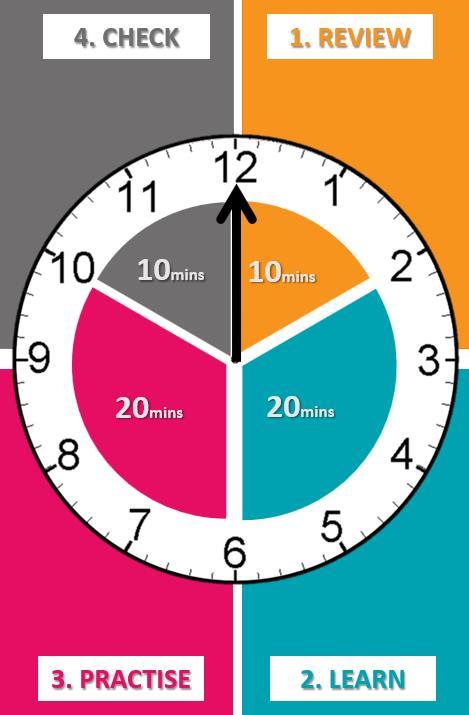

MS TEAMS
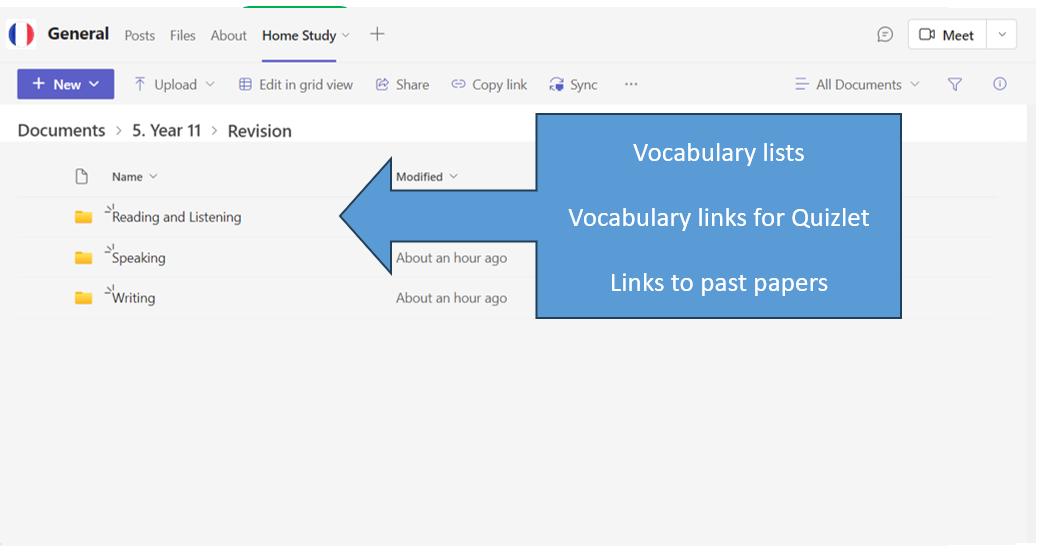
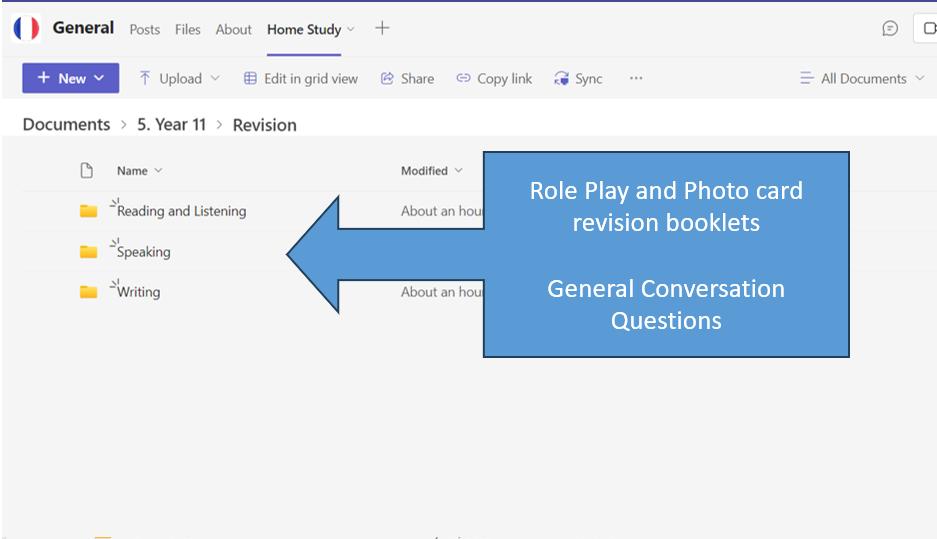

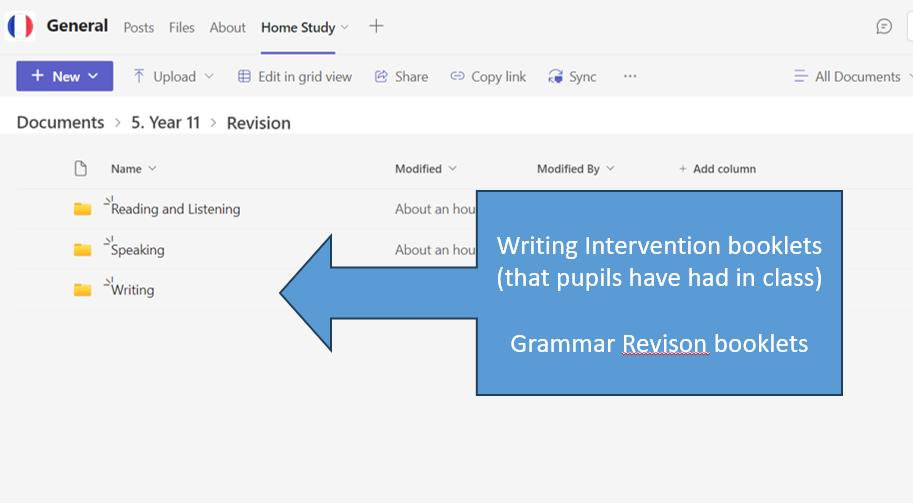
Science
What the pupils need to do this week
• Identify gaps in knowledge for unit 2 papers
• Whole class feedback workshop
• Use this feedback to focus revision over the Eater holidays.
• Ensure students know their Educake password and login.
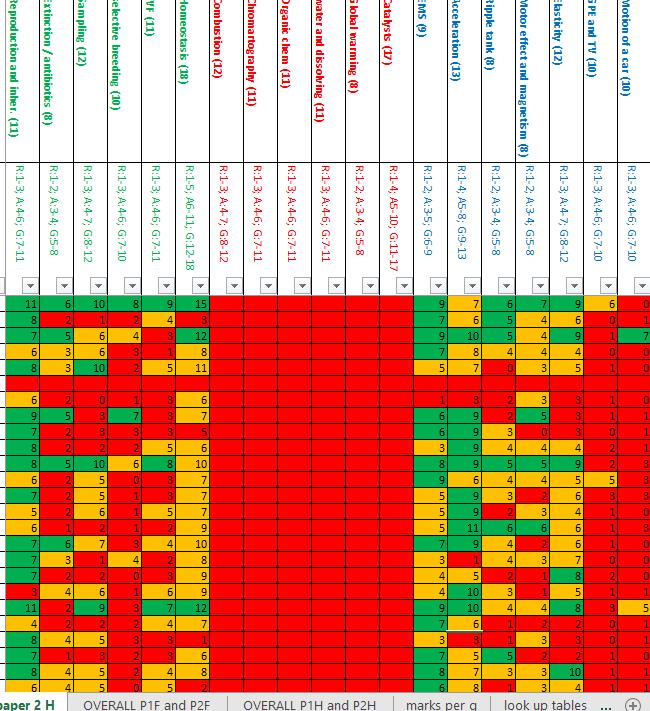
Plan for Easter
• Pupils should use their time over eater to fill the gaps they have identified in the unit 2 content.
• What is available to fill the knowledge gaps?
• MS Teams
• Knowledge organisers
• Past papers and Mark schemes
• Revision PowerPoints
• Specification Questions with answers
• SharePoint – Prospere Science Year 11
• Access to past papers refined to specific components of the spec
• PiXL PowerPoints
• Educake
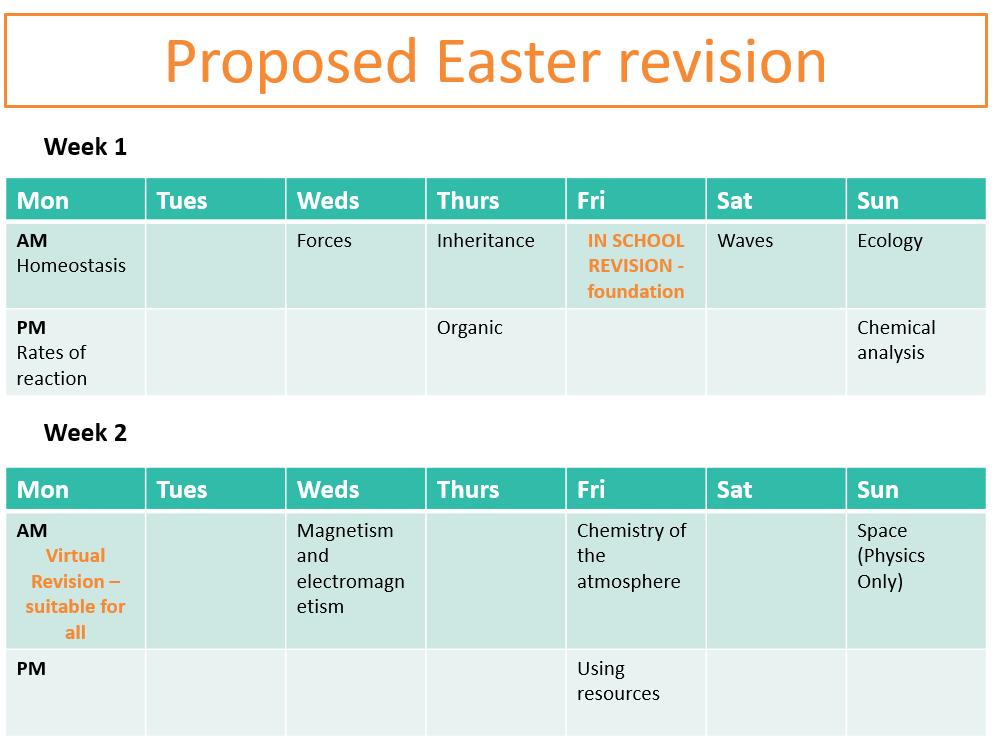
• Complete all outstanding quizzes set by teachers
• Use the Revision Wizard to fill gaps
MATHS - How to revise
It is possible to put on at least a grade in Maths from now until the Exams
Revision in Maths should be
• Routine – the same time every day
• Regular – every day for a week (at least 5 out of 7 days)
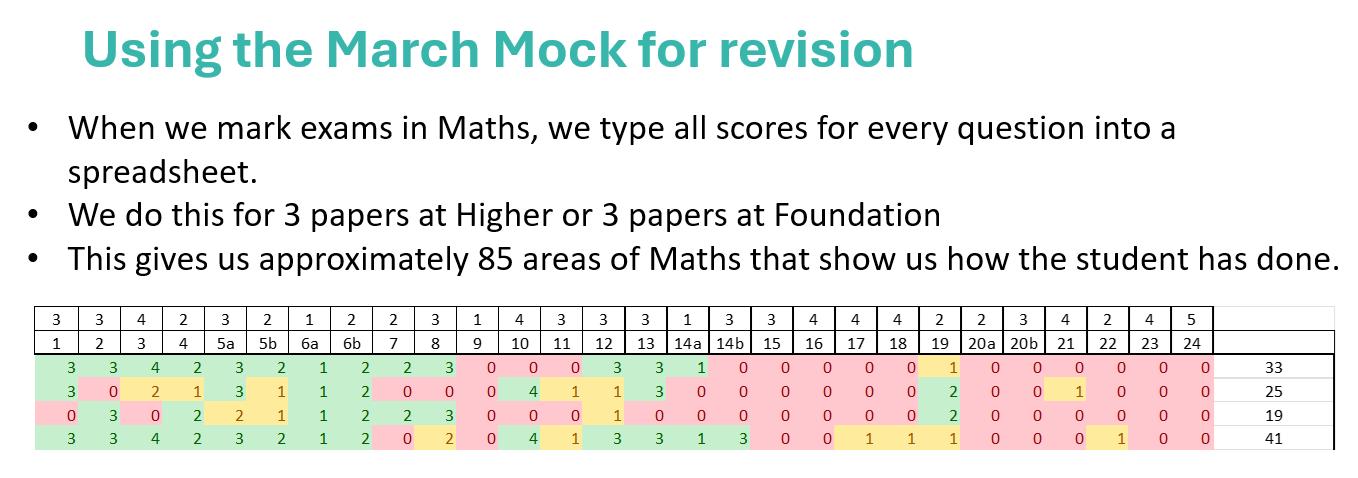
Where do I go on Sparx?
When we mark exams.
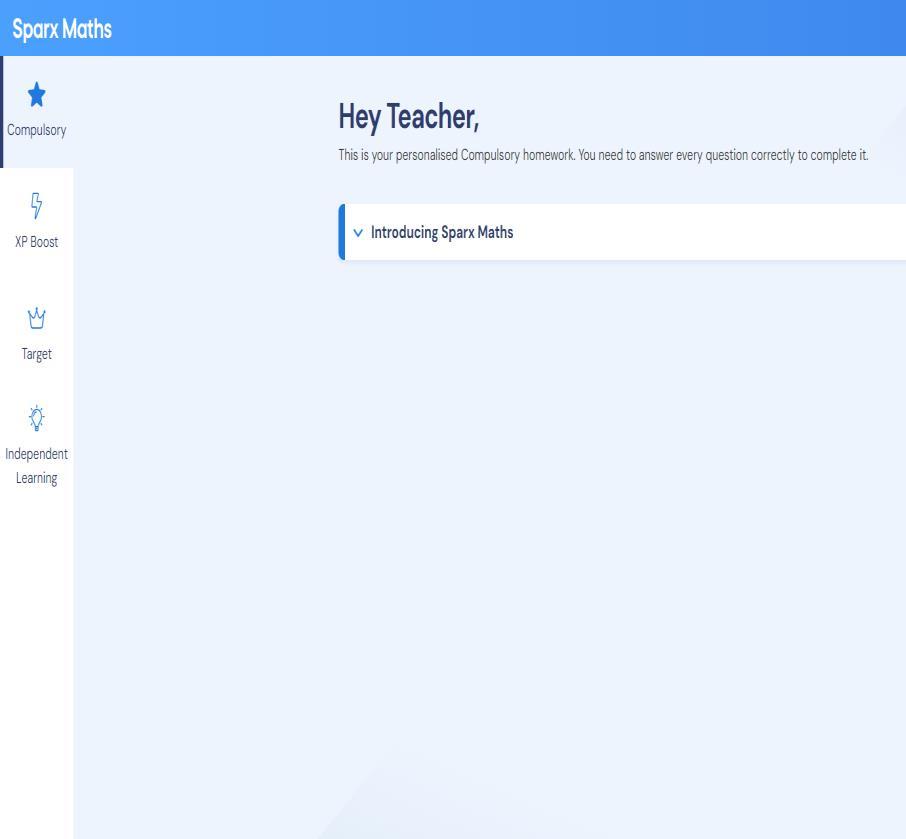
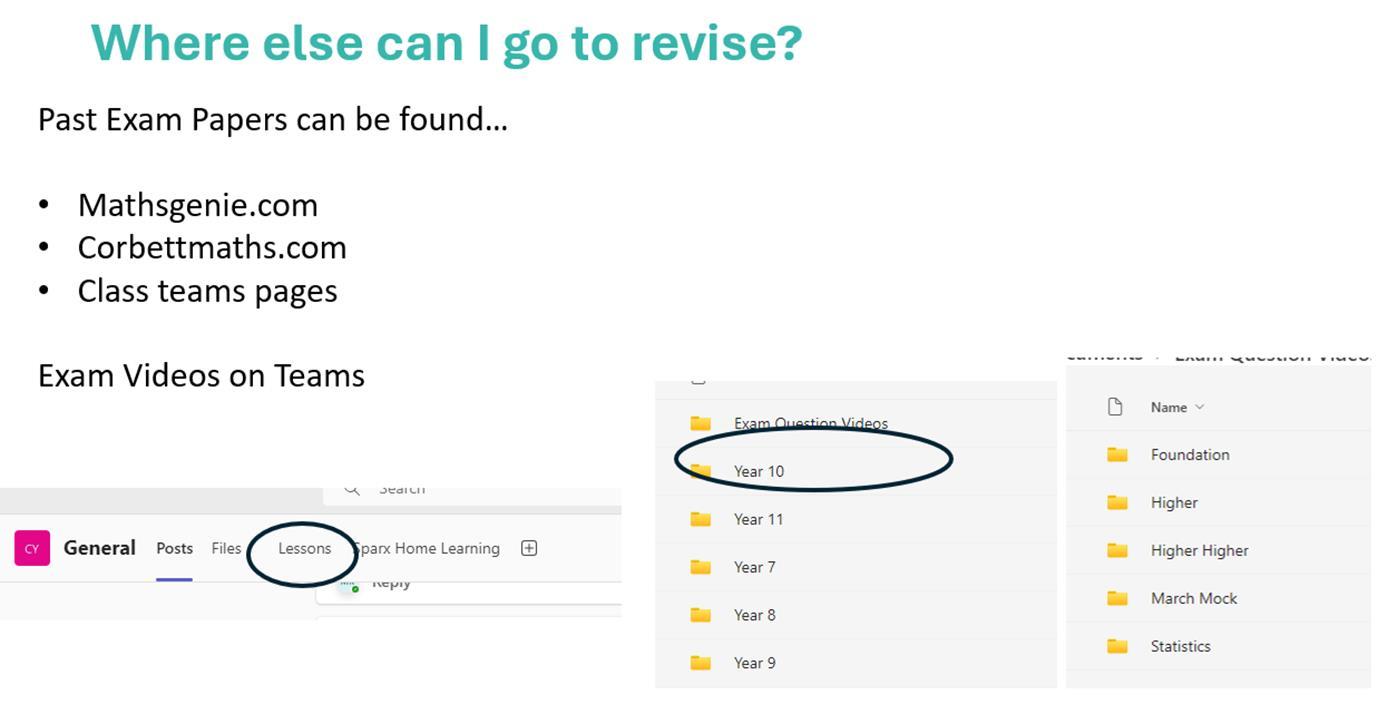
Go to independent learning on Sparx
Easter revision – resources to be sent out with students
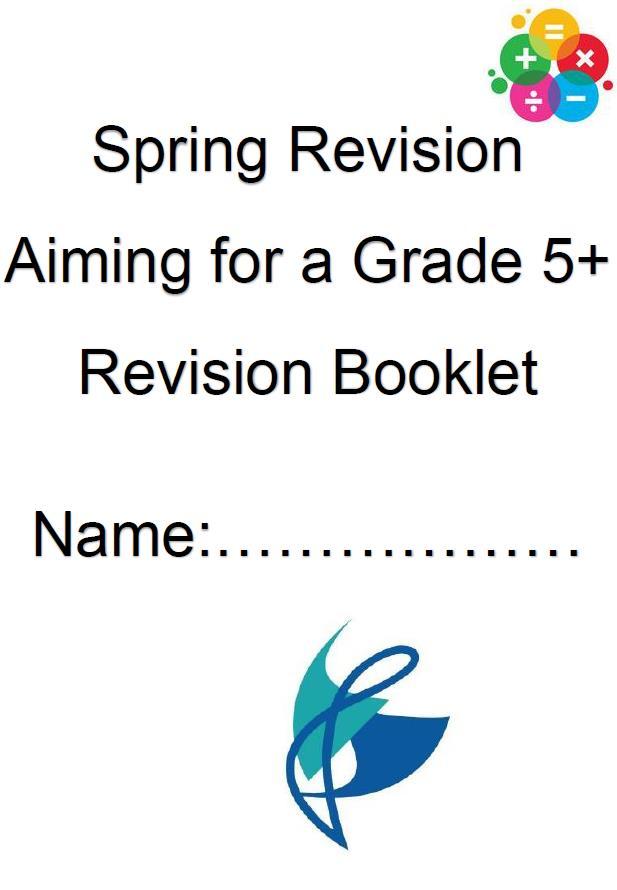
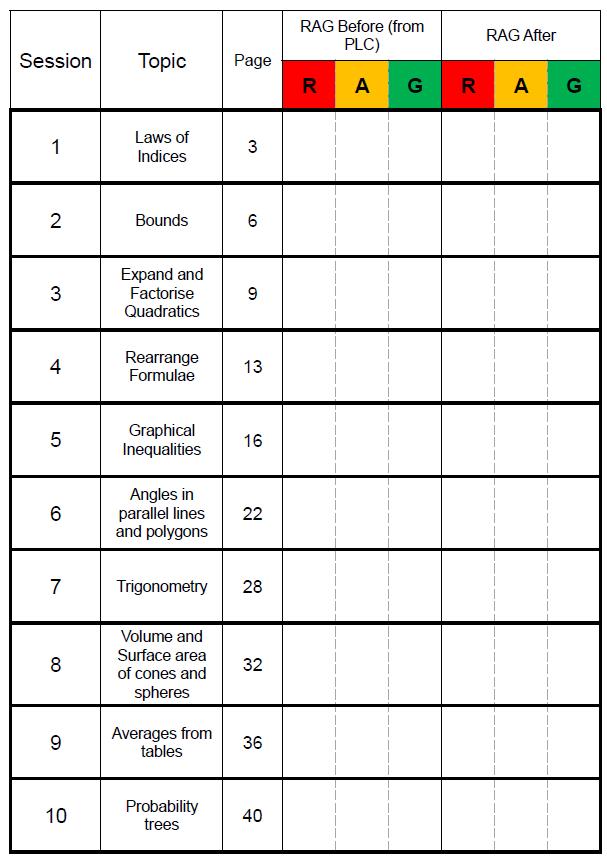


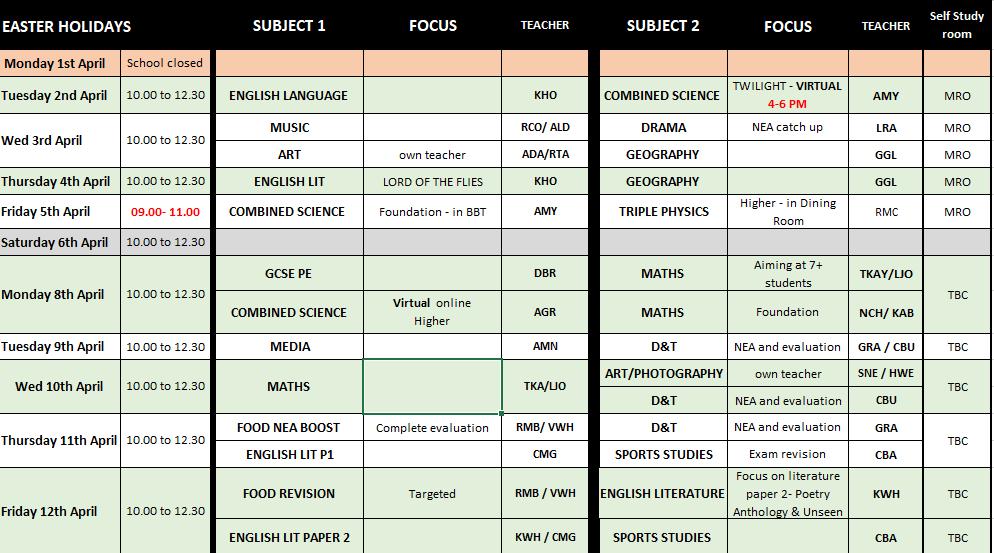


EASTER Revision Timetable
• We would advise 7 hours at least per day
• Timetable provides structure and helps build routine whilst away from school
• Use it to track revision, provide motivation and feel sense of achievement
• Plot out the in school revision sessions first that your child has signed up for
• Plot out sporting commitments, mosque, extra curricular activities, favourite TV show
• Plot out subjects for the week CORE + 4 options in the headings or each session
• Use different colours for different subjects
• Include at least an hour of Maths & English each day- stick to similar times for routine
• BE SPECIFIC
• Specify which TOPIC and which TASK you will do
• Take inspiration from teacher instructions for Easter eg English
• Hold yourself Accountable
• As parents please keep this displayed, check in with students and hold them accountable- tick off when accomplished
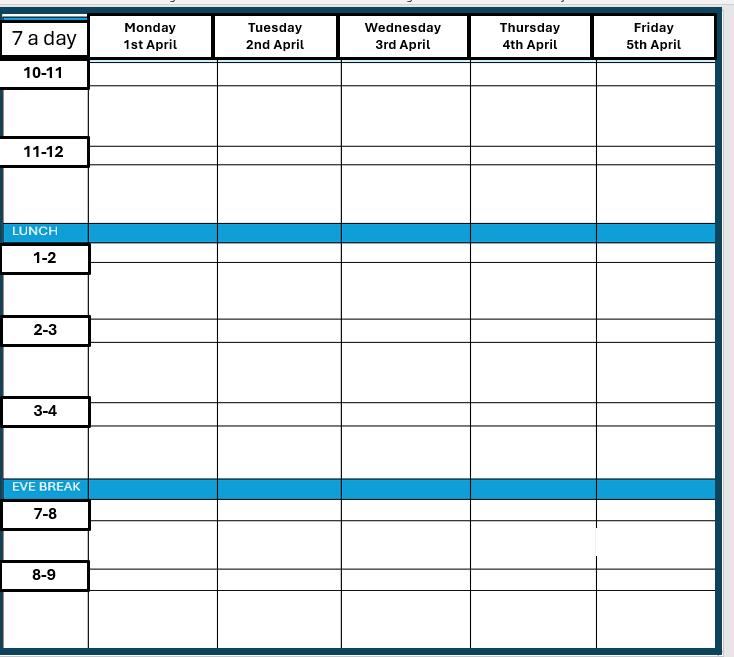
Trigonometry
revision video and Q's on sparkes
Complete half of Past paper 1 2020
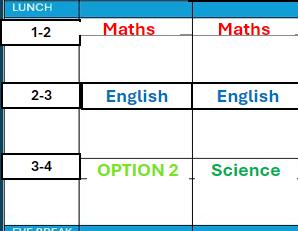
Winter swans revision notes and answer poetry Q in HMK booklet When we parted and neutral tones revision notes
Review notes Organic Chemistry and try the self marking quiz on BBC Bitesize Watch GCSE Pod and make revision cards on topic X
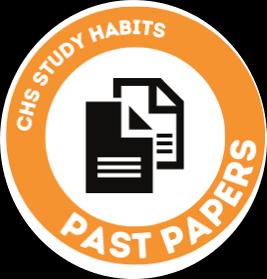


✓ Check your answers against the mark scheme or each other think like an examiner!




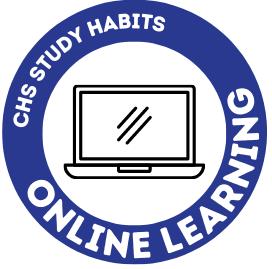
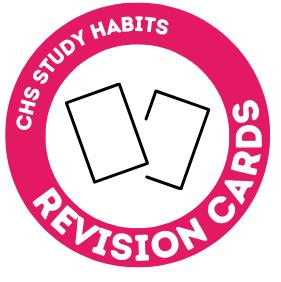
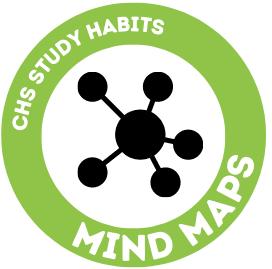
4. CHECK







1. MAP
✓ Choose an AMBER or RED topic that you are still struggling with OR pick a topic you have not looked at recently



✓ Sort your flash cards out using the ‘Leitner box’ system



✓ Update your PLC / Revision plan to reflect how secure you NOW feel about the topic




RETRIEVAL PRACTISE will help it stick!
✓ In exam conditions complete a practice exam question that links to your topic
✓ Work with a partner and test each other using flashcards
✓ Complete a set of online questions without resources
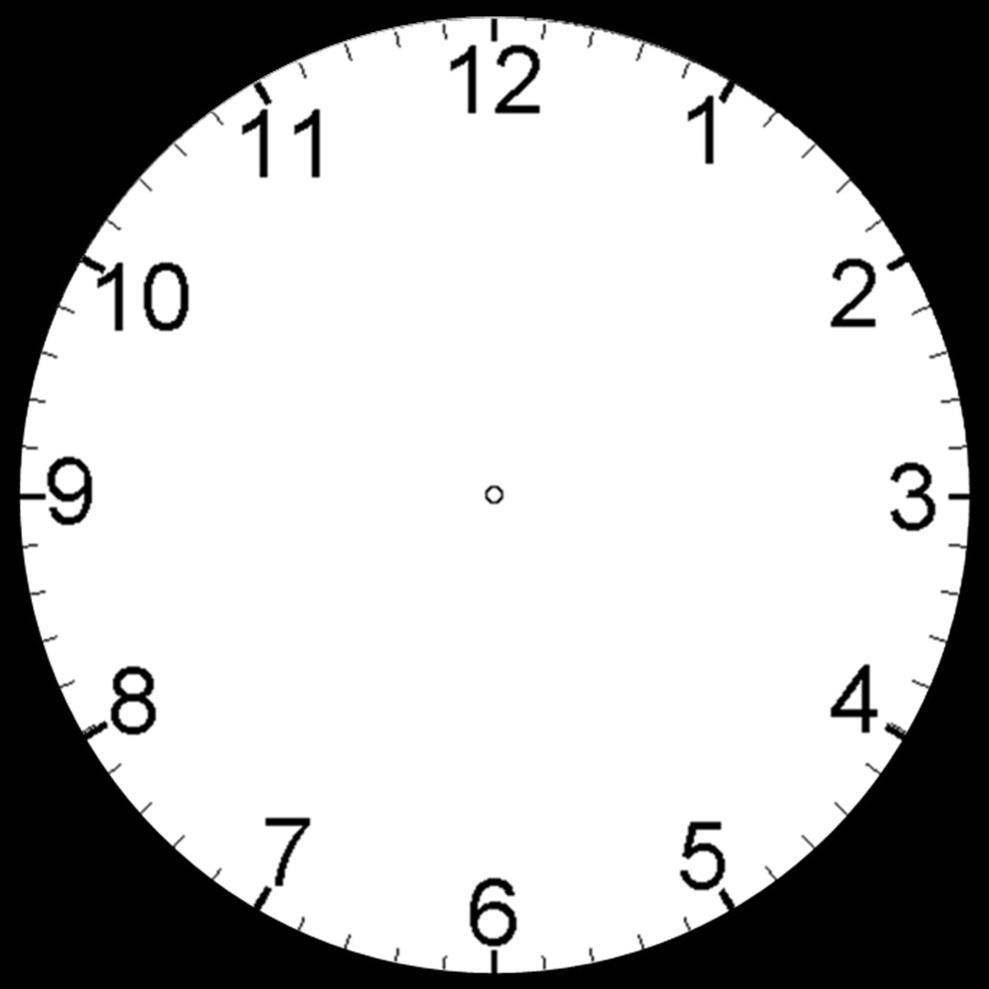
✓ ‘‘Knowledge dump’ everything you know you know about a topic or complete a retrieval quiz


min


10mins

✓ Identify a common topic you can work on with other people in the room - come up with a plan for the session






PURPOSEFUL PRACTICE is the key!
✓ INDEPENDENTLY revise using your notes, flash cards, mind maps –whatever resources you have - for 20mins.

3. MOVE FORWARD


2. MASTER
✓ Using a book, add detail to your ‘Knowledge dump’
✓ Use an online revision site to deepen learning
